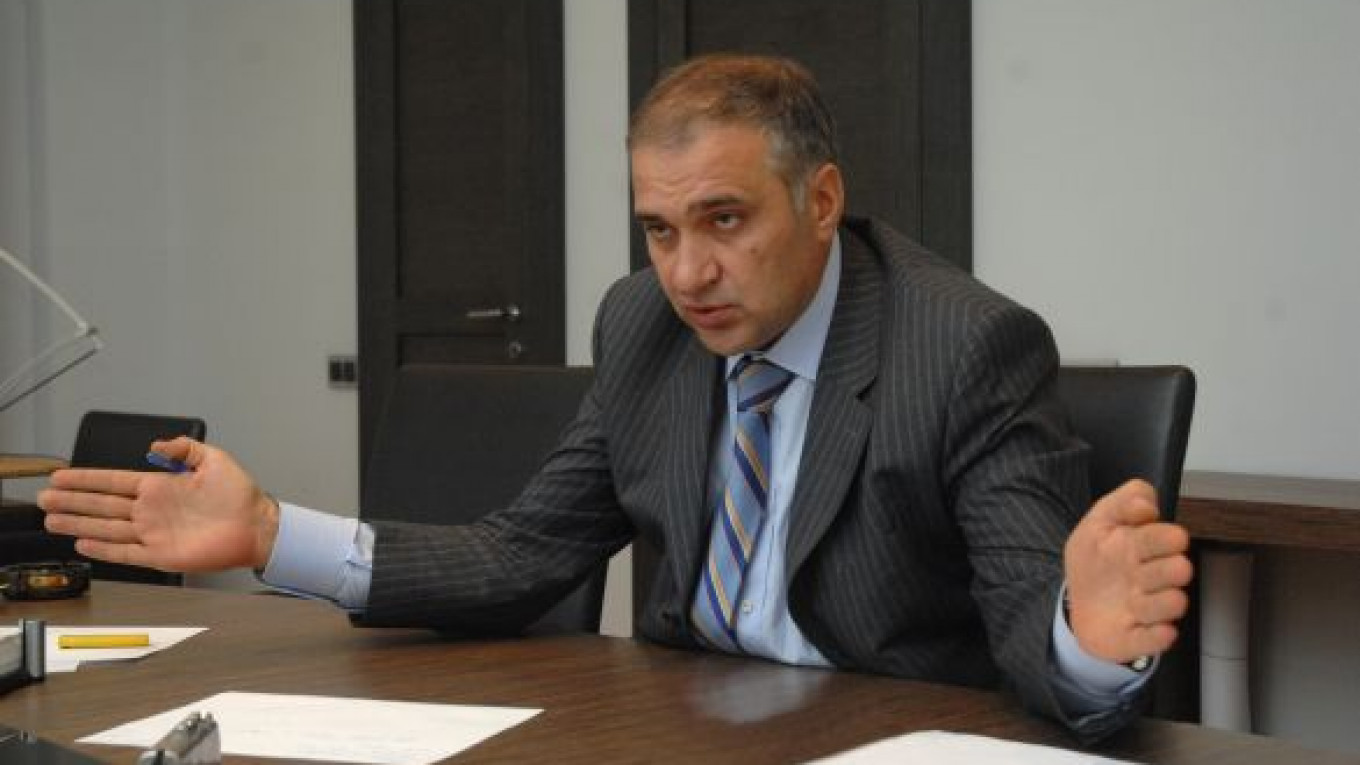Polymetal’s Vitaly Nesis, who doubled his company’s value to make it the best performer in gold mining across Europe, Asia and Africa, says he can do it all again by bringing new mining methods to Russia.
Nesis, 34, a Merrill Lynch banker before he became Polymetal’s chief executive, has pledged to hand out more than half a billion dollars’ worth of share options to senior managers and directors if they can add about $6 billion to the company’s market value by 2013. “The goal is to double Polymetal’s value to $12 billion,” he said in an interview.
Nesis’ success depends on him introducing so-called autoclave machines to recover gold from ore that can’t be processed using conventional methods, and a shipment network for raw materials. He aims to boost output to 1.4 million gold-equivalent ounces from 800,000 ounces in 2010 and may make St. Petersburg-based Polymetal one of the world’s 10 biggest gold miners, Nesis said.
“This technology is Polymetal’s ticket to the major league,” said Olga Okuneva, an analyst at Deutsche Bank in Moscow. “The key to Polymetal’s investment case is whether the company can successfully apply the autoclave technology.”
Polymetal, Russia’s third-biggest miner of gold and silver combined, is following Barrick Gold, the largest producer of the metal, and Newmont Mining in using autoclaves. The machines combine heat and pressure, known as pressure oxidation, to assist extraction from so-called refractory ores that are more difficult to process than typical gold-bearing rocks.
Plug 'n' Play
“It’s not like a mill you can just build, plug in and let go,” said GFMS World Gold managing director Paul Burton, who has been involved in the mining industry for more than 30 years. “The autoclave is expensive to put in and expensive to run. It consumes a lot of energy and needs large throughputs.”
The difficulty of getting this type of machine, previously used in Russia to process uranium, to operate on schedule and at full production, and the need to deliver raw materials over long distances, risk overturning Nesis’ estimates. Only seven plants in the world currently employ the technology to recover gold, with two new operations planned in the next 18 months, said Linus Sylwestrzak, technical manager at the Leaching Centre of Excellence at Bateman Engineering. A further eight operations have used autoclaves in the past and since closed after they exhausted their sources of ore.
Cost Threat
Agnico-Eagle Mines said July 28 that “minesite” costs at its Kittila mine in Finland rose in the second quarter from a year earlier, partly because of autoclave repairs that also reduced the availability of its mill for processing ore. President Ebe Scherkus told the Denver Gold Forum in September that it was “cautiously optimistic” that problems with rates of recovery at Kittila had been resolved, Mining Weekly reported Sept. 22.
Pressure oxidation has “typically a greater lead time for construction” and higher capital and maintenance costs than the bio-oxidation and roasting alternatives, Sylwestrzak said. Advantages may include improved gold recovery rates, an absence of sulfur dioxide emissions and less arsenic content in the final residue, he said.
Unlike rival operators of Russian mines, such as Polyus Gold and Petropavlovsk, which typically process ore near their mines, Polymetal’s plans require shipping the raw material hundreds or thousands of kilometers to processing hubs. Nesis will also need to ensure these supply routes aren’t interrupted.
“I borrowed this idea from Newmont while touring their facilities in Nevada,” he said. The system will allow Polymetal to exploit deposits, such as Maiskoye across the Bering Strait from Alaska, that others would consider unprofitable, he said.
Something Borrowed
Polymetal plans to ship gold concentrate 4,800 kilometers south from Maiskoye to process it at the Amursk hub that’s scheduled to begin operations next year, Nesis said.
“This might seem unusual but it is fully justified economically,” he said. “Nobody’s surprised Chile, the world’s largest copper producer, ships across the globe to East Asia.”
Nesis, who says his two years as an analyst for Merrill in New York helps him communicate with investors, is staking the future of his company and the stock-related payouts of his management team on achieving his goals. About 70 senior managers will be eligible for more than $500 million of bonuses if they meet his goal of doubling the company’s share price to $35.
The prospect of further output gains has already returned 91 percent for investors in Polymetal’s London stock this year. That’s the best performance among precious metal miners with a market value of at least $1 billion, outside of Canada’s Andean Resources, Semafo, High River Gold Mines and European Goldfields, according to data compiled by Bloomberg.
Know Your Enemy
Even with the collapse in global stock markets during the 2008 financial crisis, Polymetal shares are up 117 percent since the company listed in London in February 2007.
Nesis is seeking to lure new money managers, including pension funds that have limits on the kinds of companies they can buy, such as those based in Russia, by changing Polymetal’s base to the United Kingdom. That may widen the pool of investors from the current crop focusing on the emerging and gold markets, he said.
“That I worked in an investment bank is surely helpful,” Nesis said, even as he describes his time at Merrill as “dull and hard work." “Two years in the bank taught me the basic instruments — multiples, discounted cash flows, how the banks work. It’s good to know the enemy’s language.”
A Message from The Moscow Times:
Dear readers,
We are facing unprecedented challenges. Russia's Prosecutor General's Office has designated The Moscow Times as an "undesirable" organization, criminalizing our work and putting our staff at risk of prosecution. This follows our earlier unjust labeling as a "foreign agent."
These actions are direct attempts to silence independent journalism in Russia. The authorities claim our work "discredits the decisions of the Russian leadership." We see things differently: we strive to provide accurate, unbiased reporting on Russia.
We, the journalists of The Moscow Times, refuse to be silenced. But to continue our work, we need your help.
Your support, no matter how small, makes a world of difference. If you can, please support us monthly starting from just $2. It's quick to set up, and every contribution makes a significant impact.
By supporting The Moscow Times, you're defending open, independent journalism in the face of repression. Thank you for standing with us.
Remind me later.






